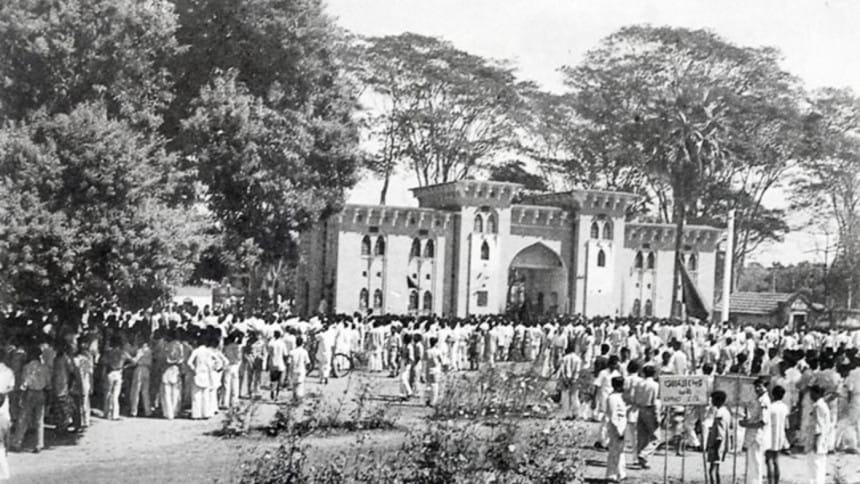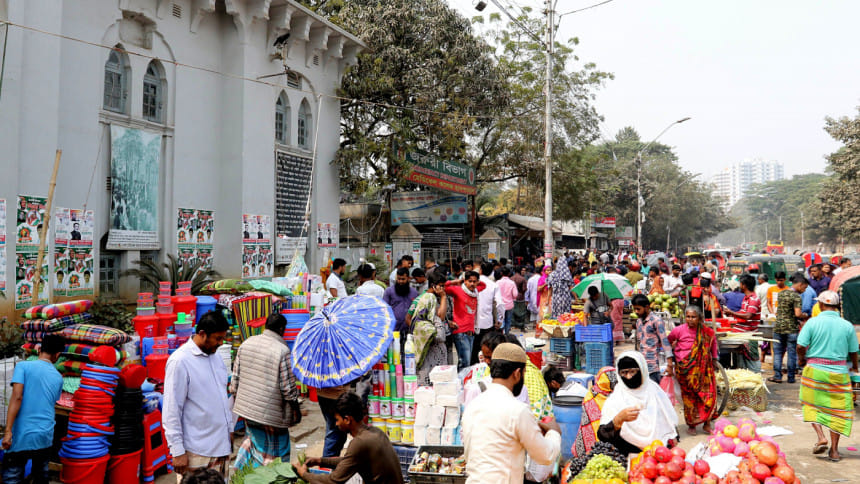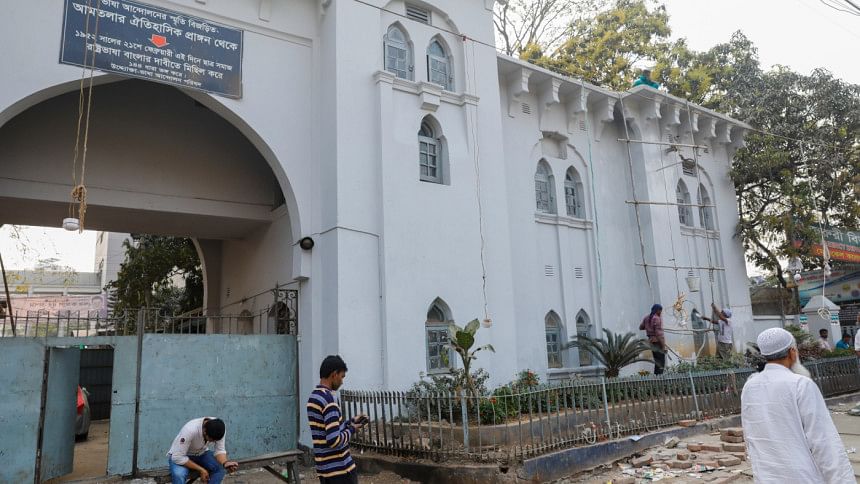The unrecognisable epicentre of EKUSHEY

Vendors encroaching footpaths, garbage lying around, self-promoting posters on the wall and haphazard parking -- residents of Dhaka are all too used to these sights, and to a large extent have accepted these nuisances and eyesores.
But what if such is the condition of a place that is of utmost importance, bearing testimony to a nation's struggle for establishing their right to speak and express emotions in mother tongue? That too in the month of February, when Language Movement martyrs laid down their lives for the recognition of Bangla as a state language on the 21st of this month -- 68 years ago.

AN EPICENTRE OF HISTORY
The historic Amtala, where Language Movement activists gathered on February 21, 1952 to defy a curfew and protest the then Pakistan government's refusal to recognise Bangla as one of the state languages of Pakistan, has become covered behind encroachers.
That day, protesters broke the police barricade to march towards the assembly at Jagannath Hall.
Police swung into action firing teargas shells and beating up the protesters. The battle between them and law enforcers spilled out on to the streets. As they kept marching, shooting began, killing Salam, Barkat, Rafique, Jabbar, Shafiur and others.
Pakistan government was ultimately compelled to include an article in the country's constitution on February 29, 1956 that declared, "The state languages of Pakistan shall be Urdu and Bengali."
However, Ekushey did not end there; it rather planted the seed of freedom in the hearts of Bangalis and 19 years after the Language Movement, an independent country named Bangladesh was born.
In 1999, Unesco declared February 21 as International Mother Language Day, in recognition of the sacrifice of our language martyrs.

UNRECOGNISABLE THROUGHOUT THE YEAR
But throughout the year, it is impossible be able to recognise the spot, unless one reads a signboard hanging atop a Dhaka Medical College Hospital (DMCH) gate.
It is now crammed with hawkers with waste lying around and posters on the wall.
Every year, right before Amar Ekushey, authorities concerned conduct eviction drives in the area, and things go back to the same after a couple of days.
This year has been no different. This correspondent visited Amtala on February 16 and 17, and found the place barely noticeable. However, on February 19, the place was cleaned up of hawkers and garbage.
When asked, vendors at the spot said they were unaware of Amtala's significance. "We are trying to make a living here, that's all," said Mohammad Harun.
Laily Begum added, "On 21st [February], people come here and take some pictures then head back to Shaheed Minar."
"The authorities conduct eviction drives before special days," said Laily, who has been selling kitchenware in the area for over 10 years.
"Where will we go?" she asked this correspondent when pointed out that they were damaging a historical site.
This newspaper also spoke to passersby in the area on February 17. Many were busy buying products from vendors, some were walking towards their destinations sidestepping all the nuisance, and only a handful paused to glance at the gate.
Mahtab Mahbub, a student of Dhaka University, said, "It's unfortunate that this historic place is in such a condition. The authorities must do something about it."
Asked about negligence of such a historical site, eminent historian Prof Muntassir Mamoon said, "It's the tradition of the country. Here, historical significance is not given its due value."
Expressing frustration over the government's indifference to such sites, the former professor of history at Dhaka University said they had been trying to protect such historical structures -- like Amtala -- for a long time, but the authorities did not pay heed.
A BAG FULL OF PROMISES
Contacted on February 17, Brig Gen AKM Nasir Uddin, director of Dhaka Medical College Hospital, said, "Amtala is an important part of the country's history. Although it is not under our jurisdiction, we try our best to keep it clean and protected."
"Every year before February 21, we spruce up the area and will start doing so soon," he added.
The director continued, "We have taken initiatives before but vendors keep on occupying the place. It is under Dhaka South City Corporation's jurisdiction. We have already asked the city corporation and the cultural affairs ministry to erect a permanent monument to preserve the historic spot."
Dr Abu Hena Mostafa Kamal, secretary to the ministry of cultural affairs, did not respond to phone calls and text messages for comments.
The area falls under ward-20 of DSCC.
Contacted on February 18, councillor Farid Uddin Ahmed Ratan said, "I will send a letter to the city corporation officials immediately, so that they can initiate an eviction drive there."
When asked why such initiative did not take place earlier, he could not provide an appropriate answer.
DSCC Executive Officer (Zone 1) Mizanur Rahman said, "Amtala is part of history. Unfortunately, whenever we evict hawkers, they occupy the place again. This is the reality."
Asked if they have any plan to preserve it, he said, "Right now, we are focusing on eviction drives to free up the place. In future, we will pay more attention to it."

 For all latest news, follow The Daily Star's Google News channel.
For all latest news, follow The Daily Star's Google News channel. 



Comments